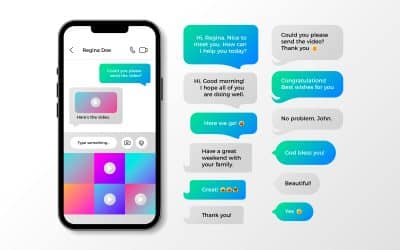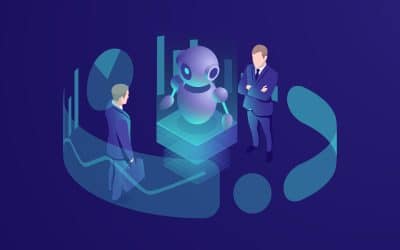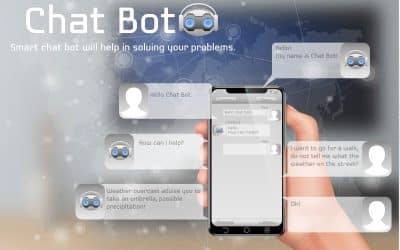Artificial Intelligence has quickly become an indispensable aspect of daily life and work. Its influence has rippled throughout numerous industries and operations globally. Especially customer support, where AI-powered chatbots have emerged as effective ways to streamline interactions. Customer support has become an indispensable element of digital customer experience for companies today, as customers expect instantaneous and effortless help. It is a cornerstone of business success today. AI-powered chatbots have also become integral to customer interactions and interactions between businesses and their clients.
In this article, we’ll investigate how chatbots powered by AI Chatbot Development Company are revolutionizing customer experiences and altering businesses’ engagement with their clients.
What Are AI Chatbots?
AI-powered chatbots are messaging tools that can simulate interactions with people. They employ AI (AI) and neural speech processing (NLP) to answer commonly asked queries. Text, messaging, or voice conversations can benefit both the client and the business. The AI machine examines the question to determine its purpose before suggesting the answer it believes is most appropriate based on the available data.
The most significant benefit of AI-powered chatbots is that they are taught and apply this expertise to predict and meet customer requirements without human intervention. From the beginning, businesses can train AI automated bots for detection and responding to queries by providing them with current FAQs, relevant content, and different versions of the same query. This allows AI chatbots to understand the most frequently asked questions, respond immediately that are faster, and provide regular customers with consistent support.
AI-driven chatbots become more innovative with time, taking in the lessons learned from every conversation, comprehending the meaning behind the issue, and educating themselves to provide more appropriate solutions. AI chatbots increase the number of queries they answer and the precision of their replies with every new interaction they engage in. The more advanced AI chatbots can provide automated suggestions as the user types questions.
Evolution Of Customer Support
The customer support process has developed dramatically over the years, adjusting to changing technology and consumer needs. In the earlier days, customer service was mostly based on phone conversations and in-person interactions. Customers were required to call a specific support number or visit a physical location to get help with questions or concerns. Traditional customer support was often associated with long waiting times, limited access, and the requirement to relay information to several agents.
One of the significant trends in customer support is the rising use of self-service solutions. This has been gaining popularity because customers are looking for quick solutions to problems. Thanks to the accessibility of FAQs, knowledge bases, and online forums, users can get answers to the most common queries without having to reach customer service directly.
Another significant development in customer support is the increasing use of omnichannel support. The customer now demands a seamless experience through multiple channels, including email, phone live chat, email or social media, and messaging applications. To satisfy these demands, businesses have invested in integrated customer service platforms that unify all channels of communication.
Importance Of Customer Interaction In Business Success
Recent customer service trends show that customer interaction is at the core of an efficient customer service company. This refers to the dual interaction between the company and its customers, encompassing every interaction and touchpoint during the customer journey. In the modern-day business environment, the importance of interactions with customers has proliferated due to a variety of crucial motives:
Building Relationships With Customers
Effective interactions create strong relations between companies and their clients, setting up new patterns in the customer-service business. Good experiences result in increased customer satisfaction, loyalty to the industry, and advocacy, which in turn contribute to a business’s long-term success.
Understanding Customers’ Needs
Interactions with customers can provide insight into their preferences, concerns, needs, and expectations. Companies that pay attention to their clients can adjust their offerings, services, and marketing strategies to meet their customers’ needs.
Brand Reputation And Trust
Reliable and thoughtful customer interactions help establish a good brand image and build customer trust. However, negative interactions can harm a business’s image and turn customers away.
Competitive Advantage
Excellent customer service is a significant competitive advantage for businesses in a highly competitive market. Using the latest customer service technology can ensure that your company is ahead of its competitors.
Customer Feedback And Improvement
Interactions with customers provide an opportunity for feedback. Businesses can use the input received to pinpoint ways to improve, solve issues, and improve the quality of their services.
The Benefits Of Chatbots For Customer Support
Chatbots powered by AI in customer service are becoming increasingly sought-after due to their numerous advantages. AI-powered chatbots have these significant benefits:
Rapidity And Effectiveness
AI chatbots provide immediate support for customer queries, offering immediate responses without the need to engage a human. Their automated and effective nature allows them to quickly resolve simple queries, resulting in speedy resolution and enhanced customer satisfaction.
24-Hour Availability
Customers do not have to wait until business hours to get their concerns addressed. Chatbots respond instantly to customer queries, eliminating the requirement to wait to see if a live agent is available. This ensures that customers receive prompt help, increasing overall satisfaction.
Multilingual Support
AI chatbots can assist in a variety of languages, which allows companies to increase their customer base worldwide by using translation and language recognition capabilities to connect with customers in the language they prefer. This overcomes barriers to communication in different languages and provides effortless service to customers worldwide.
Respond To A Large Volume Of Questions
Chatbots are adept at handling an enormous amount of customer inquiries in a single session. They can manage multiple conversations in one go, thus reducing clients’ wait time.
Better Data Collection
Chatbots can collect important information on customers’ inquiry patterns, preferences, and other aspects. They can give insights into businesses’ strategies by analyzing customer interactions and identifying patterns, trends, and preferences. That can be utilized to enhance business operations in product development and marketing strategies. This results in an informed decision-making process and more significant customer interaction.
Improved Customer Engagement
Conversational AI tools can improve customer satisfaction and engagement by providing timely and personal interactions. They can quickly answer customers’ inquiries, give specific recommendations, and provide specific solutions tailored to their demands. This results in more satisfied customers, greater satisfaction, and a higher level of satisfaction with customers.
Deliver Omnichannel Support
Customers would like to be supported where they’re at ease. This could be via WhatsApp, X (formerly Twitter), or Facebook Messenger chatbots. Chatbots can be used on virtually every social media platform to assist customers wherever they’d like to be. They provide a consistent customer experience, regardless of which platform your clients are using. They don’t require specific training, as human agents do.
Automatic Routing To The Correct Representative
When customers need humans to assist if the customer’s request requires human interaction, the AI chatbot could use the information gathered to connect the customer. That too with the appropriate customer service representative, thereby making it easier for customers to engage and be satisfied.
Customized And Tailored Interactions
Chatbots powered by AI can offer personalized interaction with clients. They analyze customer information, including purchase history and preferences, for customized advice and support. By understanding the individual needs of customers, chatbots can offer pertinent ideas, recommendations, and solutions, increasing customer satisfaction.
Cost-Effectiveness
Conversational AI can reduce operational expenses and boost profits by automating routine jobs. It provides 24/7 customer support and manages many requests, leading to increased efficiency, lower costs, and more revenue-generating opportunities.
Improved Customer Insights
Companies can use the information obtained from AI chatbots to understand customers’ moods and spot general patterns. The data could provide valuable insight into sales and marketing strategies. Chatbots that run on artificial intelligence can provide businesses with various benefits, from enhancing customers’ experience to decreasing operational expenses.
Many companies recognize that high-quality customer service can positively impact customer loyalty, retention, and word of mouth as an example. Therefore, businesses are increasing their efforts to equip their customer service departments with automated bots that give fast and efficient assistance to customers while decreasing their expenses for operations and thus increasing their profits.
Humans Should Be Able To Concentrate On The Most Challenging Demands
Chatbots won’t be able to replace the team you have. Indeed, 78% of customer service managers say their chatbots have capabilities that are different from those of digital agents. They can enable your staff to tackle the most complicated requests that require human interaction. Chatbots can take on repetitive tasks and free your staff to create some impact in places where AI isn’t sufficient.
Adopting Chatbots In Customer Service To Enhance Customer Interactions
If you’re not yet able to implement AI Chatbot Development Services in the customer service department, take note of the following tips for deciding the best route:
Integration Of Systems
Integrate chatbots in all your customer service communication channels to ensure coherence. Information from customer interactions must be accessible to every member of your customer service team. Human agents should be able to jump into the conversation at any time and carry on the conversation without dissatisfying the customer through re-running old content or re-starting conversations from scratch.
The Correct Data For Training
Be sure to look for relevancy, quality, and accuracy in selecting customer interaction information to feed your AI chatbot. This will increase the likelihood of giving you relevant responses, which means you’ll get more relevant answers. Additionally, it allows it to deal with a variety of inquiries.
Suitability
With the variety of chatbots for customer service, make sure you determine which platform best suits your customers’ services and goals. Consider factors such as integration features, sentiment analysis, and natural processing. Find a chatbot service that can continuously adjust to adapt to your changing requirements.
Feedback And Assessment
Continuously monitor chatbot interaction for its performance (response time, response times) and gather information on the rate of resolution and customer satisfaction. Use analytics to improve chatbot performance and gather feedback from customers to improve chatbot functionality and responses.
Limited Utility
Chatbots’ usefulness is limited due to their inability to handle complex requests and comprehend human emotions and requirements. Human customer service agents should be in place to handle any interaction where chatbots exceed their capabilities. This could help de-escalate conflicting emotional situations.
Use Cases Of AI Chatbots Customer Service
We will now examine the various use cases of chatbots that can be used for customer service.
Support And Customer Queries
Conversational AI solutions will solve complex questions from customers and also provide assistance through sophisticated artificial technology. They analyze and understand complicated customer inquiries, offer precise responses and help clients through the steps to resolve issues. This will result in efficient and speedy support for complex queries from customers.
Marketing And Sales
Virtual agents may aid in the process of product recommendation as well as cross-selling and upselling. Through customer data such as preferences, browsing habits, and habits to provide personalized recommendations and recommend relevant products or services throughout their journey. This results in more sales and increased potential for revenue growth for companies.
Imagine visiting an online retailer’s clothing website and you start chatting with their chatbot. They want to know about the size of a pair of jeans. The chatbot joins you over a chat and inquires about your fashion preferences, preferences for size, and the ideal fit. Based on the answers you provide to the chatbot, it uses its algorithm to recommend some options of pants that match your style preferences.
If you are interested in a particular pair of Jeans, the bot will promote them by suggesting a belt or sneakers that match them. The chatbot could also suggest an option to upsell you by suggesting more expensive versions of the jeans, with added attributes or even a more expensive brand.
Reservations And Booking
Chatbots can assist with reservations and booking procedures for business owners. For example, those who deal in hospitality, by providing a simple and easy way for guests to book reservations, verify availability, and get confirmations of bookings.
Hotels’ websites, social media, and messaging platforms allow customers to interact with an AI chatbot. Customers can inquire about room availability, rates, and other features. Chatbots can provide instant answers based on the hotel’s booking system. They can also help clients find the right solution based on their needs.
Suppose a customer chooses to reserve a space when booking a room. In that case, the AI chatbot can help them navigate the reservation process and collect essential information like check-in and checkout dates, room types, and payment information.
Once the reservation is made, the chatbot can produce a confirmation invoice and forward it to the user through email or a messaging platform. Chatbots can also notify the customer before the date of check-in, making sure that the reservation remains at the forefront and reducing the chance of cancellations.
Delivery Updates And Tracking Orders
AI bots can provide instant notifications on order status and delivery details. Once a user has placed an order with the chatbot, it will instantly send an email confirmation that includes the order details. The AI chatbot powered by AI can summarize the order and request confirmation from the buyer. They can also give immediate updates regarding the order’s progress and status by connecting with the company’s tracker system for orders.
In addition, the chatbots will send proactive alerts to clients as their order process moves through various stages, such as processing, shipping, and delivery. The alerts are sent through messaging platforms, SMS, or email, depending on the client’s method of communication preference. If any modifications in the delivery timeframe include delays or changes to the schedule, the chatbot can quickly notify the customer and update the information.
Onboarding And Training
Chatbots can help the onboarding process for new customers. Individualized and interactive tutorials provide instructions on how to use the product. Interactive tutorials chatbots provide interactive instructions to customers who are new to the service so that they understand how to utilize the service or product. In particular, chatbots provide step-by-step instructions, visual explanations, and interactive exercises to guide users through various tasks and processes.
The AI tools can answer frequently requested questions (FAQs) and help new customers with problems. The chatbot can use natural process of speech (NLP) capabilities to comprehend customers’ queries and offer precise and pertinent solutions. Chatbots can also provide solutions to common problems, offer tips and best practices, and assist clients in overcoming obstacles. It can also send out notices or reminders to clients, provide advice on how to proceed, and even highlight milestones or accomplishments to keep clients interested and motivated during onboarding.
Control Of Your Accounts
Chatbots, which are conversational AI tools, can aid in setting up and managing accounts by providing customers with guidance through creating accounts, handling password resets, and addressing billing queries. They advise on the additional procedures required to set up an account, such as verifying email or establishing security questions. Chatbots can respond to customer requests for password resets and confirm their identity using various authentication methods, including email verification, phone number verification, or security queries. The chatbot will then begin resetting passwords and assisting customers in the steps needed to create new ones.
They can also assist with billing issues. AI tools can also assist clients with billing queries, including monitoring account balances, reviewing invoices from previous years, adjusting payments, and resolving issues with billing. Chatbots can access customer details in real time, giving accurate and current billing information. If needed, the chatbot can forward billing problems that are complex to a representative from a human to get further help.
Social Media Engagement
Chatbots can be integrated into social media platforms to provide customer service and interaction quickly and effectively, responding swiftly and accurately to customer inquiries or concerns. For instance, it is widespread to add chatbots with conversational AIAI to Facebook Messenger.
Challenges And Limitations Of AI-Powered Chatbots
Chatbots powered by AI have made considerable improvements in the past few times but have faced several issues. These are the main limitations that come with chatbots powered by AI:
Cultural Barriers And Language
The biggest challenge facing chatbots powered by AI is their ability to effectively speak in different cultures and languages. The nuances of language, idioms, and cultural references are challenging for chatbots to grasp and react to in a timely manner.
Human Touch Is Absent
The main drawback of chatbots is their lack of human contact, including emotional intelligence, which makes them ineffective for all customer interactions. Although chatbots can efficiently address routine questions and offer rapid responses. But they lack the emotional intelligence and conversational capabilities that humans could provide in instances where the customer requires individual attention and emotional support.
Customers may also have particular or complex questions that need human interaction as well as humans’ judgment and creative or critical thinking abilities that chatbots do have but do not. Chatbots rely on pre-programmed answers and cannot comprehend complex questions or offer custom solutions beyond what they can program.
Dealing With Emotional Or Complex Customers’ Questions
Chatbots powered by AI often have issues dealing with complicated or emotional customer questions. They may be unable to understand the precise nature of the problem or offer empathetic answers. Understanding and addressing complex or emotional issues typically requires a human level of comprehension, empathy, and discernment, which could be difficult for chatbots to reproduce. A chatbot, for instance, employed by a mental healthcare helpline might not have the emotional knowledge required to properly address someone experiencing an emotional health issue.
Limitations In Capabilities
Chatbots might not be capable of handling complex problems that require human interaction, which can cause customer discontent and dissatisfaction. Additionally, chatbots could have technical glitches, such as misinterpreting customer queries, resulting in incorrect or ineffective responses.
Security-Related Concerns
Chatbots are susceptible to security breaches or hacking, which could lead to customers losing data. There are many ways by which chatbots could be vulnerable to hacking or security breaches. Initially, chatbots are vulnerable to phishing attacks, which are attempts by attackers to deceive users into divulging sensitive data like login credentials or financial details. This could happen via the chatbot’s conversational interface itself, as well as through attachments and links included in the chat.
Chatbots are also at risk of malware attacks. Malware can be introduced into the chatbot’s software in various ways, like unsecured network connections or hiding malicious code in messages sent to chatbots. When malware is in place, it may break into private information or take over chatbots’ operations.
Future Prospects In AI-powered Chatbots
Future prospects for chatbots powered by AI look extremely exciting. As technology advances and AI algorithms become more advanced, Chatbots are expected to become more sophisticated and efficient in delivering extremely personalized, human-like experiences.
Chatbots powered by AI have found applications across various industries, including healthcare, customer care, finance, e-commerce, and healthcare. The future has enormous potential for chatbots to grow into new sectors and industries. For example, in education, chatbots can provide personalized guidance and assistance to students and customize education experiences. For travel-related businesses, chatbots may assist with planning travel, recommend routes, and offer actual-time information on accommodation and flights.
Naturally-processed language (NLP) and comprehension are critical components of AI-powered chatbots. Significant improvements are expected concerning NLP methods and designs that allow chatbots to recognize and interact with human conversation. This will lead to improved comprehension of context, sentiment analysis, and the capability to deal with complex questions. When chatbots get better at recognizing subtleties and subtleties, they’ll be able to engage in deeper interactions and give more precise and personalized answers. The result will be more human and natural interactions, further blurring the boundaries between human and AI interaction.
Final Take
Chatbots powered by AI have transformed customer service. Intelligent virtual assistants fitted with the most advanced algorithms and natural language processing capabilities have revolutionized how companies interact with their clients. They can comprehend and quickly respond to queries. Chatbots offer speedier response times, greater access, and increased customer satisfaction.
Automating repetitive tasks, chatbots free human operators to work on more complicated questions, improving overall efficiency and effectiveness. With technology continuing to improve, AI-powered chatbots can improve customer service experiences, accelerating economic growth and creating closer connections between businesses and their loyal clients. The demand for top-quality customer support continues to increase, and AI-powered chatbots are an indispensable tool for companies that want to succeed in the current technological age.











